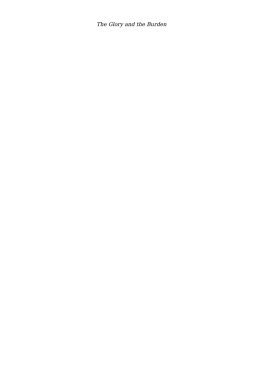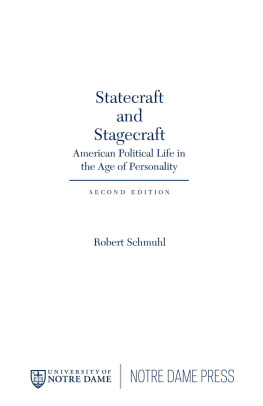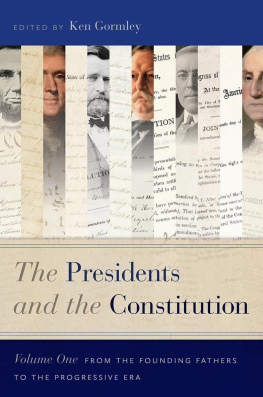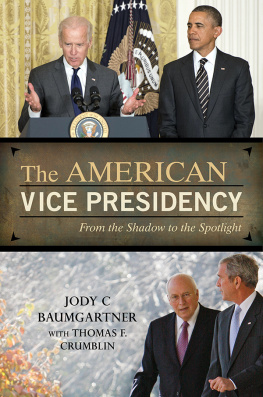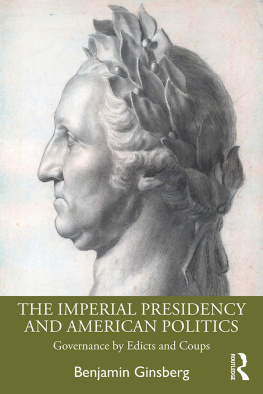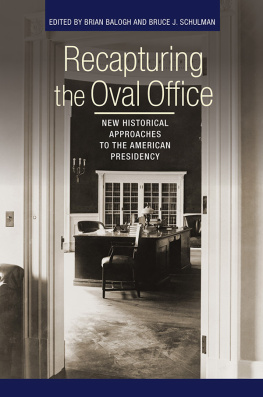University of Notre Dame Press
Notre Dame, Indiana 46556
undpress.nd.edu
All Rights Reserved
Copyright 2019 by University of Notre Dame
Published in the United States of America
Library of Congress Control Number: 2019021436
ISBN: 978-0-268-10673-7 (hardback)
ISBN: 978-0-268-10675-1 (WebPDF)
ISBN: 978-0-268-10676-8 (Epub)
This book is printed on acid-free paper.
This e-Book was converted from the original source file by a third-party vendor. Readers who notice any formatting, textual, or readability issues are encouraged to contact the publisher at
P ROLOGUE
My fascination with presidents and the American presidency began innocently enough when I was a small child, through the kindness of a hotel bellhop. On a family vacation to Kansas City, we were staying at the Hotel Muehlebach, and my grandmother happened to be a Muehlebach and one of the hotels founders. Ralph, the bellhop, indulged a befreckled squirts obsession with collecting autographs of big-league baseball playersmost teams stayed at the Muehlebach when they played in Kansas City from the mid-1950s into the 1960s. But one time, no doubt in an attempt to broaden a youths limited horizons, he proposed a new adventure. Instead of pointing out players in the lobby, whom I could corner into signing the baseball I unfailingly carried around, Ralph recommended a tour of one of the hotels restricted areas: the presidential suite. As we went up on the elevator, he patiently listed the numerous presidents who had stayed there, devoting most of his monologue to Harry Truman.
Beginning with his boyhood in Independence, and during his later years in Kansas City, Truman maintained strong connections to his stomping ground of western Missouri. Indeed, as I subsequently learned, the Muehlebach became known as White House West during his nearly eight years in office. What does an eager, young visitor do amid such historic surroundings? While Ralph was turning on lights around the penthouse, I decided to sit at the piano Truman used to play and plunked on the keys with wild abandon. Ralph kept this inharmonious interlude to himself, and, for once, I didnt get into trouble.
Learning about Trumanwe also visited the Truman Library and Museum in Independenceserved as just the beginning. By the earliest years of high school, I knew I wanted to work in journalism, so keeping up with the news (including coverage of Washington) became a daily and rewarding commitment. Being called prematurely old by classmates and others should have hurt my adolescent feelings, but it really didnt.
During senior year of high school, besides spending many more hours at the local newspaper as a part-time reporter than I did bookworming to prepare for college, I wrote a major research paper, the subject of which turned out to be Barry Goldwater and Conservatism. Why a seventeen-year-old decided to devote forty pages of juvenile scholarship to a losing presidential candidate and his cause two years after his landslide loss in 1964, I cant remember. Yet heeding the teachers advice, I sent a copy of what I had written to the man who had run and led the movement. In his response, Goldwater said he enjoyed reading my immature effort at erudition, adding a concluding sentence: I appreciate this more than words can ever express and I wish you success and happiness as you enter college. (There was a nice compliment for my treatment of conservatism, but he didnt address one of the papers conclusions: It is unlikely that a conservative will run again for the presidency in the next few elections. Ronald Reagan wouldnt win his first term as Californias governor until November 1966, and he was, as it turned out, four campaign cycles away from winning the White House in 1980.)
During my undergraduate yearsthe late 1960s and into the spring of 1970it was impossible to avoid keeping a close eye on the serving presidents. Lyndon Johnson and Richard Nixonwith their controversial decision making about the Vietnam Warconcentrated the mind of every male facing the possibility of being drafted. Though I composed numerous dispatches for newspapers and magazines about this tumultuous era, it wasnt until graduate school and the Watergate investigation that I definitely decided that contemporary political affairs, particularly the presidency, would be the focus of my teaching and writing. Until then, Id followed a traditional, rather unexciting path in pursuit of a doctorate specializing in American literature and American studies while writing fugitive pieces of journalism to stay in training. What could be more conventional or predictable for a graduate student interested in both literary and journalistic matters than a dissertation about Mark Twains autobiographical narratives?
However, during a writing course I was teaching as a graduate instructor in 1973, a student raised her hand and wanted to know why so many people on television and elsewhere were talking about what was then referred to as the Watergate affair. She inquired with innocent sincerity, What really happened? It was a question and a class session Ill never forget. For the remainder of the period, as I explained the break-in at the Democratic Party headquarters at the Watergate complex and other nefarious deeds that ultimately resulted in Nixons resignation a year later, everyone in the classroom seemed uncharacteristically alert and genuinely curious. Somehow or other, worrying about split infinitives or the proper placement of adverbs faded in importance.
During this time, I happened to be reading The Education of Henry Adams. One sentence in the book kept returning to my thinking: The progress of evolution from President Washington to President Grant, was alone evidence to upset Darwin. I wondered what Adams might have said about Nixon, and its a question Ive asked myself about subsequent presidents since then.
While serving my last years in graduate school, I was lucky enough to jump from the English Department to a new center that had been established in the wake of Watergate and was dedicated to the study of American institutions, including the presidency, Congress, and journalism. There I was able to teach and to do research. Good fortune continued when a regular faculty position in American studies at another university followed this five-year immersion in contemporary affairs.
Before too long, besides teaching an assortment of classes, I was writing journal articles, op-ed columns, and lengthy magazine essays about political topics, from time to time over the next few decades publishing collections of previously published articles or books that amplified my shorter works. Beginning in the 1980s, each presidential campaign became something of a marathon talkathon for providing commentary and punditry of one kind or another. Print reporters would call for a paragraph or two of analysis, and radio or television producers would request sound bites or longer interviews. In due course, invitations arrived asking me to lecture on the current White House occupants or the presidency in front of audiences, both domestic and foreign.
Journalistic shorthand has occasionally branded me a political scientist, which I most assuredly am not. Other pithy phrases have described me as a politics professor or, somewhat more intriguingly, a political professor. The late, incomparable Christopher Hitchens went so far in an essay for

